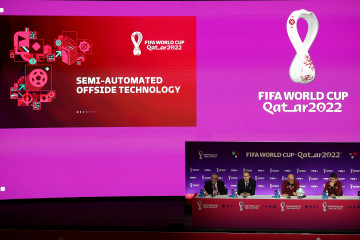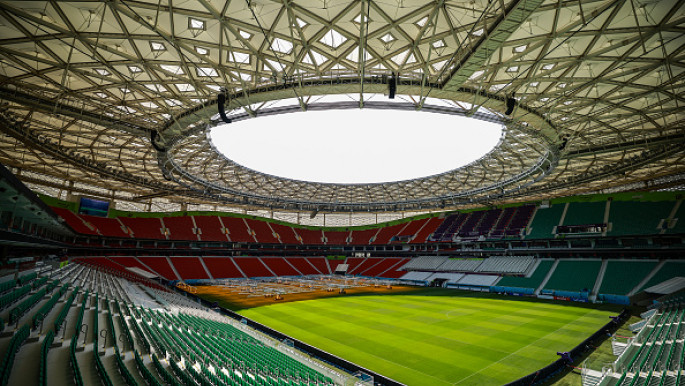

The Qatar 2022 World Cup has promised to be remarkable from a technological point of view. Extensive efforts were made by the Qatari state to enhance the experience of all those attending the biggest event in the football calendar using state-of-the-art digital technology, from the players themselves to the fans, coaches and technicians.
The World Cup began on November 20 in Qatar and is the first ever held in the Middle East and the Arab world.
Maryam Hamad al-Muftah, Executive Director of ICT at the Supreme Committee for Delivery and Legacy (SC), previously stated: "In light of our continuous preparations for the tournament, we are sure that fans here in Qatar and around the world will enjoy an impressive and unparalleled version of the World Cup."
"A sensor installed inside the ball's centre will accurately determine the location of the ball at all times, and therefore be able to acknowledge the occurrence of an offside position or not"
FIFA President Gianni Infantino also stated previously that FIFA was "committed to harnessing technology in the interest of improving the game of football at all levels."
The following are just some of the cutting-edge technologies due to be used in the Qatar World Cup 2022.
Semi-automated offside technology
During the Qatar World Cup, FIFA will use semi-automated technology that will help referees identify offside situations, providing the referees with automatic alerts to offside situations with great accuracy. In the event of an offside decision being made, the fans in the stadium will be communicated with easily via large screens in the stadiums which will replay the offside.
Check out the Al Rihla launch event 👀⚽@adidasfootball | #OfficialMatchBall pic.twitter.com/qAm8PaEhG0
— FIFA World Cup (@FIFAWorldCup) March 31, 2022
The technology, which was tested at the 2021 Arab Cup and FIFA Club World Cup 2021, uses 12 dedicated tracking cameras mounted under the roof of each stadium which will track the movement of the ball and 29 points on the body of each individual player 50 times per second to calculate their exact position on the pitch at any given moment.
Al Rihla: A fusion of sport and science
The official Qatar 2022 World Cup ball, Al Rihla ("the journey"), will play a major role in applying the offside detection technology, as a sensor installed inside the ball's centre will accurately determine the location of the ball at all times, and therefore be able to acknowledge the occurrence of an offside position or not. The sensor will offer video assistant referees instantaneous information to help optimise their decision-making.
Al Rihla was produced by the German company Adidas, who claim it will be the "fastest and most accurate" ball in World Cup history.
"The Qatari SC has also launched the Bonocle device, which will help the blind and visually impaired to maximise their engagement with – and their enjoyment of – the World Cup. They will be able to use the device to convert all digital content into Braille"
Leading cooling technology
Players and fans in Qatar will find themselves in a comfortable atmosphere because 7 out of 8 stadiums during the Qatar 2022 World Cup are fully fitted out with advanced air conditioning technology to maintain temperate conditions inside the stadiums.
Air will be pumped out from vents in the corners of the stadium and from beneath the seats, with sensors that will help stabilise the temperature and adjust air flows for seats in the shade and others under the sun.
The rising air will be sucked into the stadium's cooling system, purified using water kept at 7°C, and then pumped back into the stadium.
The technology is powered by solar energy and filters air from outside which is then pumped into the field and stands.
Hayya App
The Hayya digital platform is one of the most important platforms in the Arab region today, in that it is the official gateway to obtaining the mandatory digital Hayya Card.
The Hayya platform will save football fans wishing to visit Qatar for the World Cup precious time and effort during the upcoming event, assisting with everything from searching for the best place to stay to following the matches from the stands. Hayya will also help visitors discover all the must-see sites Qatar has to offer.
Assisting visually-impaired fans
The Qatari SC has also launched the Bonocle device, which will help the blind and visually impaired to maximise their engagement with – and their enjoyment of – the World Cup. They will be able to use the device to convert all digital content into Braille. The device's designers hope this will enable the visually impaired to be able to navigate the tournament and interact with other fans more easily.
Tech facilitation in all spheres
Tech developers and the Qatari authorities have deployed sensors on the roads to identify the movement of traffic on them, and taxi drivers and parking attendants will benefit from these sensors which will provide them with real-time information on the movement of traffic, helping them perform their work.
Other ways technology is present at every level throughout the period of the tournament will be in food delivery apps which will even allow fans to have meals brought directly into the stadium stands; transport apps; wireless connectivity and charging for any mobile device, and Wi-Fi, with the electricity to power these installations being generated by in-built solar and bifacial photovoltaic panels.
This is an edited translation from our Arabic edition with additional reporting. To read the original article click here.
Translated by Rose Chacko
This article is taken from our Arabic sister publication, Al-Araby Al Jadeed and mirrors the source's original editorial guidelines and reporting policies. Any requests for correction or comment will be forwarded to the original authors and editors.
Have questions or comments? Email us at: info@alaraby.co.uk





 Follow the Middle East's top stories in English at The New Arab on Google News
Follow the Middle East's top stories in English at The New Arab on Google News


